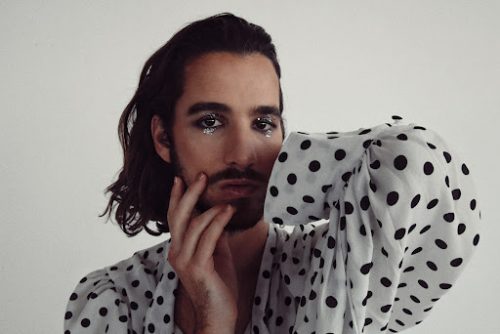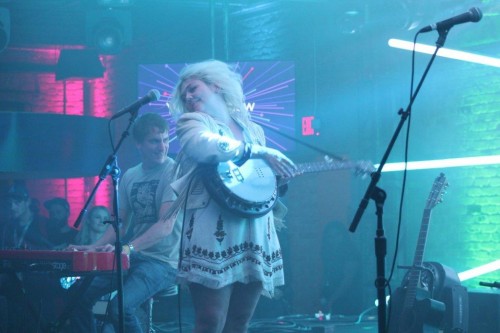This sounds like the hyperbole that typically accompanies an album release, the usual “This is the best thing I’ve ever done,” or “This is a true representation of me as an artist,” until the next album is released, of course. But “Good Man,” the new album from New York singer, songwriter and multi-instrumentalist Miles Francis, has truly been life-changing. The process of making the album in the same room where they learned to play drums as a 6-year-old led to a journey of self-discovery in which Francis emerged with the realization that they are nonbinary. The juxtaposition of intense self-examination and outward celebration is at the core of the album, the first since their EPs “Swimmers” (2018) and “Doves” (2019).
Francis has given “Good Man” an equally immersive and celebratory album release cycle, having performed for five hours on a truck driven around NYC, hosting an event called GOODMANAGANZA and prepping for a multi-pronged, full album-release show on Wednesday, April 27, at The Sultan Room in Brooklyn.
Francis also has worked and continues to work as a touring and recording drummer with the likes of Will Butler (a founding, and now former, member of Arcade Fire), Sharon Jones, Allen Toussaint and Antibalas. We recently chatted with Francis about the journey of making “Good Man,” their “truck tour,” balancing their sideman gigs with the true calling of their own music and what they have in store for Wednesday night’s event.
What motivated you to make this album?
The album came together, I’d say it kind of revealed itself to me and revealed a lot of things I didn’t expect by the end of the process. The songs on this album, they were kind of percolating as early as 2017 or so, around when the #MeToo movement was coming into the mainstream conversation, and I was having a lot of conversations with the men in my life and also reflecting on my own masculinity and my own behavior and tendencies, and it sort of started me off on a series of songs where each song was kind of a deep dive into one specific element of my psyche or kind of just the more general male psyche. Over the course of the years of working on the album, it reflected things about my own manhood, and I eventually came out of the process nonbinary and I ended up having a whole personal revelation. The album has been basically just my way of processing masculinity over the past three to five years.
These are deep, serious themes, but the music is very upbeat and has a party vibe. How does that dichotomy work for you?
I think a lot of that comes from my relationship with Afrobeat music with Fela Kuti and Tony Allen’s music. I discovered that music when I was in college and that music is really heavy, emotional music set to like danceable beats, and kind of that duality I think just struck a chord in me and I’ve always loved funk music, r&b music, rock, pop, and I think just that idea of using your mind and body to process music, something I think David Byrne mentions in “How Music Works,” he mentions something about making music for the mind and the body and that was part of what Talking Heads were all about, and Prince as well. I’ve always gravitated toward musicians who are singing about deeply personal things or serious topics, but dancing through them. That’s my own way of processing, and I write ballads too, but what comes first is rhythm and a beat, and maybe it’s because I’m a drummer or maybe it’s because I feel I need to move in order to work through those topics.
You have your own studio, where you recorded “Good Man.” Tell me about that space.
My studio, it’s called Cornelia Street Studio, and it is in the basement of the building that I grew up in, so it’s the same room where I learned to play drums when I was 6, and it’s the same room where I played with all of my first bands — my whole musical identity and a lot of my just general identity has been formed in that room. It’s a space where I can truly be myself, and it’s this windowless room in a basement, but it’s in the heart of Greenwich Village and there’s a lot tied to it for me.
In the ultimate metaphor, by the end of the process of making the album and I was starting to tease out some of the music, it got hit by Hurricane Ida, I think it was, and the whole thing got flooded and I had to take up all the floors and I actually just am now finishing the renovation that has taken six-plus months, and so it was this symbolic like, “OK, you made this album, let’s wash it away and start anew.”
Tell me about playing on the back of a truck.
The truck tour is something that I’m so glad that I landed on. It’s one of those ideas that you talk about, it comes up, but you don’t actually pursue it because there’s so much involved in it or you don’t know if you really want to do it. I’m glad that I pushed through and made it happen. I’ve never felt more at one with New York City where I had grown up. I just felt like I’m just a part of the milieu, part of the menagerie of the city and some people didn’t even notice me and other people would stop whatever they were doing and dance. Every time I do it I feel closer to New York in a small way and I’m going to be doing it regularly this summer, because it’s really a magical feeling and I want to kind of make it a habit especially as we’re isolating more and more and it’s easier and easier to just stay in your zone and not break out of it, and doing the truck tour helped me punch through the sort of social media existence that artists are now living in and just doing it the old-fashioned way, getting out on the street and hitting people with some music and getting a beautiful reaction.
The night before the album was released, you held an event called GOODMANAGANZA at Porter Studio in Brooklyn. What was that all about?
I’m a big fan of creating a little world for people when they listen to the album, they feel like they’re enveloped in this world and when they’re watching the videos it’s a whole kind of journey, and wherever I can, to actually create physical space for people to literally walk into the world and feel like they learn a little bit about what went into the album, and the GOODMANAGANZA event, and also the upcoming Sultan Room show, I wanted people to feel like they are walking into my psyche or just the universe of this album, because I get a little envious of visual artists, how they can occupy a gallery and leave it up for people to walk through and go at their own pace and there’s a multi-sensory aspect to it. And with music, yeah, you walk in and you’re seeing a band live, but you’re smelling the bar, you’re seeing the lights however it’s lit, and I want to be able to have control over all of hose things, just like a visual artist would have over a gallery. So that’s my approach, and I can’t do it for every show, obviously.
Your full album release show is Wednesday, April 27, at the Sultan Room, also in Brooklyn. What do you have in store?
I’m really excited about the bill. My friend Kalbells, Kal [Kalmia Traver] from Rubblebucket, has a band called Kalbells, they’re going to open with a set, and also an artist named RaFia is doing a solo opening set, and they’re great. There’s going to be a couple DJ sets, one from Will Butler and Aguapanela Mami is doing a late DJ set, so it’s going to be a whole evening. For my own set I’m putting together like a 10-piece-plus band because I kind of have a “go big or go home” approach right now, I think as a result of being forced to not play shows as often as I would like. … I’m gonna have horns and background singers, multiple percussionists.
How do you compare this process of executing your own vision to being a sideman where your job is to help another artist realize their vision?
I think every musician has a different relationship with that. For me, I came up doing a lot of supporting and being a hired drummer — not a hired drummer, but being a drummer with a capital D was my entrance into a music career, and the more I did it, the more I realized that I wanted to really write music and produce music and that drumming was actually part of like a color palette and drumming was a lot of how ideas start, but then I realized, I zoomed out and I realized I want to write and arrange and do these other things through the medium of drumming but is not only about drumming, so that pushed me to really search for what I was looking for, which is hard when you come up and you’re working as a drummer and you’re going on tour and doing all of these things, but you’re going, “Why am I not satisfied with this?” So for me it was just acknowledging that and coming to peace with it, then really diving into what my real calling is. I still think it’s really valuable and important to be in situations where I’m supporting others’ music. I still do play drums, play music with other people’s projects, I play with Will Butler, I play with an artist named Stefa, and stepping into those supportive roles is very important to me because it maintains balance in my own universe, but ultimately I can’t help but execute my visions that I have, and that I’ve sort of now identified as what I’m here to do, quote-unquote.



Leave a Reply